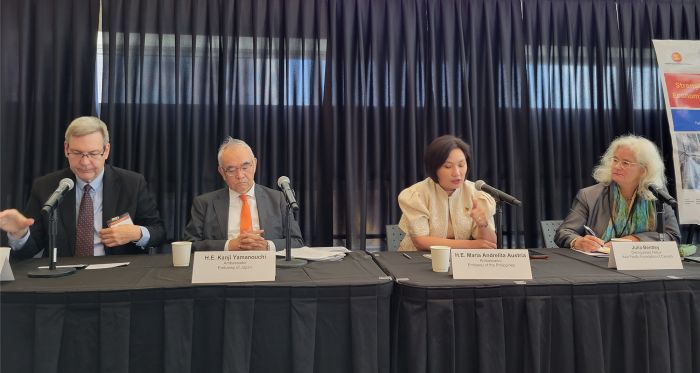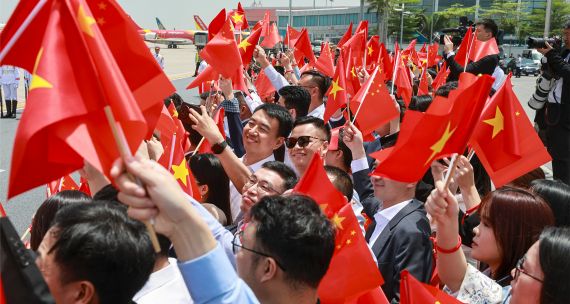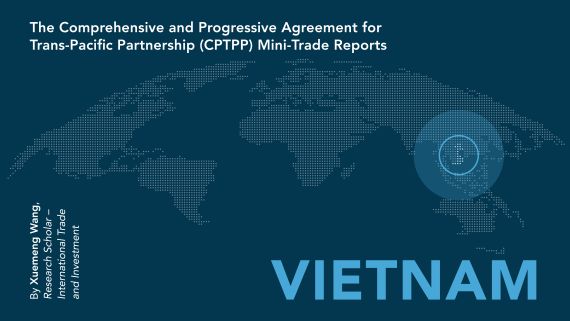On October 22, 2024, the York Centre for Asian Research’s (YCAR) Canada-ASEAN Initiatives program brought stakeholders together in Ottawa from the Canadian federal government and the diplomatic, business, and academic communities to discuss how to promote government and industry collaboration to strengthen economic security and resilience between Canada and the Association for Southeast Asian Nations (ASEAN). The event was hosted by the University of Ottawa’s Telfer Management School Executive MBA Program, with support from the ASEAN Committee of Ottawa, the Asia Pacific Foundation of Canada, Export Development Canada, Manulife, and Global Affairs Canada.
The symposium was the third multi-sector event in Ottawa organized by YCAR’s Canada-ASEAN Initiatives program. The first, in October 2023, focused on economic co-operation, and the second, in May 2024, focused on regional security. This fall 2024 symposium spotlighted Canadian and Asian perceptions of the imperatives of closer government-industry collaboration and the importance of considering how Canada can meet Southeast Asia’s needs in terms of food, energy, and environmental security and how it can help ensure reliable supply chains, as advocated in the recent ASEAN-Canada Joint Leaders Statement on Enhancing ASEAN Connectivity and Resilience.
Highlights from the discussions are summarized below.
Canadian policy approaches to advancing economic security with ASEAN countries
Participants shared their perspectives on Global Affairs Canada’s efforts to engage the private sector in Canada’s Indo-Pacific Strategy and the ASEAN-Canada Strategic Partnership, as well as their expectations for achieving stability in inclusive economic growth and diversifying trade and investment partnerships with ASEAN. They also provided insights into how trade agreements with ASEAN and Indonesia are expected to stimulate and diversify supply chains and open new markets, provide greater regulatory certainty and promote transparency, strengthen food and energy security for ASEAN member states, and promote Southeast Asia’s green transition.
The Comprehensive and Progressive Agreement for Trans-pacific Partnership (CPTPP) is seen as a platform for promoting economic security and resilience with ASEAN states that are members of the agreement (Brunei, Malaysia, Singapore, and Vietnam). During its year as chair of the CPTPP Commission, the priorities Canada is pursuing are progressive stewardship, comprehensive utilization of the agreement (for example, by small and medium enterprises and women), and pathways to CPTPP accession.
Export Development Canada, Canada’s export credit agency, supports government-industry collaboration by enabling the implementation of Canada’s trade and investment policies and supporting Canadian companies in expanding their businesses in Southeast Asia. Its approach to risk management in the region includes extending longer-term credit, including in local currencies, and providing solutions that reflect environment, sustainability, and governance (ESG) considerations.
Diplomatic perspectives on and from Southeast Asia
Participants reiterated the importance of factoring in Southeast Asia’s priorities when building economic partnerships, including adopting a long-term view, taking into consideration how ASEAN is evolving, and being aware of what it takes to be seen as a trusted and reliable partner. Similarly, consideration must be given to building momentum to benefit the citizens of both ASEAN countries and Canada and raising awareness of opportunities, for example, through Team Canada Trade Missions to Southeast Asia and ASEAN roadshows to Canada. Linkages to national business associations across Asia can help Canada leverage partnerships, and Canadian chambers of commerce in Southeast Asia can add value to Canadian commercial engagement.
In pursuing economic security and resilience, particular attention should be paid to the critical role of finance and capital, whether in the form of remittances, pension funds, or insurance, and to the energy transition away from coal and fossil fuels to renewables and nuclear energy. Digital co-operation and connectivity and infrastructure – including green infrastructure, are additional avenues for collaboration. Animal and plant health and marine resources are two other dimensions of economic security that merit attention and offer opportunities. As president of the G7 in 2025, Canada has an opportunity to shape that body’s agenda to complement the ASEAN agenda and explore G7 synergies and collaboration with ASEAN.
Canada’s energy resources at the intersection of geopolitics and global warming
The role of Petronas, Malaysia’s state energy company, and its investment in Canada’s energy sector was cited as an example of economic engagement between Canada and Southeast Asia that should be better understood, as it sits at the intersection of geopolitics and global warming. As Southeast Asia’s offshore gas resources are being depleted, Canada’s liquefied natural gas (LNG) offers a pathway to reducing reliance on coal and switching to lower-emission alternatives. Petronas has a 25 per cent stake in LNG Canada in Kitimat, B.C., which is slated for startup in late 2024 as one of the plants with the world’s lowest carbon emissions intensity and whose exports are destined for Asia.
Making Canada’s relevance to Southeast Asia visible, reliable, and coherent
Both the academics and business representatives in attendance advocated for Canada making greater efforts to raise awareness of the complexity of Southeast Asia and its economic sectors, and of Canada’s comparative advantages as a meaningful strategic partner, including as a supplier of energy. Companies were reminded that they need to listen to and understand the needs of Southeast Asian clients and demonstrate that they have foresight and staying power.
Options for building public-private partnerships to boost Canadian success in Southeast Asia were promoted, including utilizing supply chains to connect big corporations to small and medium enterprises. For Team Canada Trade Missions to be effective (and to avoid giving the impression that they are merely ‘fly-by’ events), there need to be clear and specific targets, and government-generated momentum needs to be harnessed to advance business interests. That could include, for example, providing access to decision-makers. Finally, building the Canadian workforce’s capacity to be effective in Southeast Asia is vital, as is the ability to tell Canada’s story in Southeast Asia coherently to resonate with local concerns and priorities.
Understanding socio-political realities in Southeast Asia to build trust and partnerships
Asian participants noted that developing strong and close partnerships with ASEAN countries requires building trust by balancing three pillars: cultural, economic, and security. Connecting through culture should precede economic relationships, and sound economic relationships are a prerequisite for pursuing co-operation in peace and security. Following through on strategies over time is indispensable to demonstrate Canadian goodwill and overcome skepticism in some quarters. To this end, Canada needs to implement a pragmatic and concrete relationship-building program to sustain and further develop momentum in deepening engagement with ASEAN.
Prompting deeper conversation among government, diplomatic, business, and academic circles
Deepening relations with Southeast Asia, particularly with Indonesia, Malaysia, the Philippines, Singapore, and Vietnam, presents a vital opportunity for Canada and the region amidst other challenges in Canada's engagement in the Indo-Pacific.
This symposium resonated among those with an interest in shaping policies to foster closer and more integrated long-term economic security and resilience between Canada and ASEAN. Participants welcomed the opportunity to hear the diverse views of the panellists; to have the opportunity to network with stakeholders from government, diplomatic, business, and academic circles; and to engage in a timely discussion on economic security and resilience and sustaining momentum for increasing Canadian interest and activities in Southeast Asia.
Author Julia G. Bentley is a Distinguished Fellow of the Asia Pacific Foundation of Canada and an External Research Associate of the York Centre for Asian Research. She produced this summary in consultation with Julie Nguyen, Chair of the Canada-ASEAN Initiatives at York University, with whom she co-organized the symposium. She also served as a moderator and gave closing remarks at the symposium. Edited by Erin Williams, Senior Program Manager, APF Canada.





